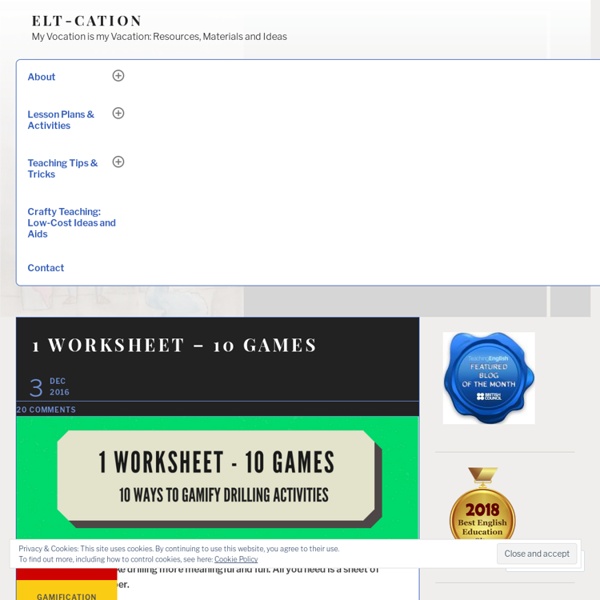24 defining and non-defining relative clause games
1. Trivia sentence building challenge Give or brainstorm a list of things that trivia questions are often about, e.g. the Amazon, the Statue of Liberty and Einstein. Students should choose one of the things from the list and say something true about that thing or person, e.g.
Black Mirror as Pedagogical Tool in the College Classroom
by Frank Bridges — Rutgers University May 08, 2015 – 00:00 In Danah Boyd’s “Participating in the Always on Lifestyle,” she states, “I may not be always-on the Internet as we think of it colloquially, but I am always connected to the network. And that’s what it means to be always-on.” Discussing this pervasive concept to an undergraduate class can sometimes be a daunting task. Students might be competent with Yik Yak, Instagram, and Snapchat, but have never heard of Google Glass, big data, and the Deep Web. Anthropologist Amber Case echoes Boyd’s thoughts with the idea that a mobile device on our person makes us all nodes on a network distributing and consuming information.
Long Live the King!
These are my top five reasons out of 1,003,908 other reasons for not writing a blog. Originally posted here Scientists have recently discovered a brand new dinosaur, called Rhinorex Condrupus, or “King Nose” in lay man’s terms. Actually, the 75 million year-old dinosaur (or what was left of it) was unearthed some 30 years ago but was completely forgotten about until recently when scientists pieced the royal fossils together again.
Timelines
The language used by teachers to explain time reference, particularly of verb forms, can be confusing for the students. Timelines are neat devices that can be used to clarify our teaching language. Timelines enable the communication of sophisticated concepts to the lowest level of learner, and can prompt sophisticated discussion amongst higher level learners. This article is a basic introduction to timelines. Later articles will discuss when to use timelines in class, concept checking, activities and strategies that use timelines and their potential drawbacks.
Five simple games for teaching vocabulary – TeachingGamesEFL.com – by Mike Astbury
Here are some games you can use for practising and revising a set of vocabulary with pictures. I have included a demonstration set but these games could be used with any lexical set with slight modifications. These games are motivating, memorable, easy to monitor and require very little preparation.
Simple grammar rhymes
Beginners have to memorise a lot of new words and grammar. To make the process a bit easier, I and my colleague came up with a set of simple grammar rhymes that help our learners remember the crucial verb forms. ADVERT: In this post, I would like to share the rhymes with you. There is a short video for two rhymes and the text. And one of the rhymes comes only with the audio file.
Beyond Gap Fills. Using songs to learn a language. Why, how and which?
At the beginning of this year, I was surprised to find out that many of my students, especially adults, stated in the Needs Analysis that they wanted to use songs. I must admit that I’m used to using songs in the YL classroom all the time (especially clapping games – my personal favourite!) but I didn’t pay too much attention to the importance of music in the teen / adult class.
25 ideas for using WhatsApp with English language students
Philip Haines is the Senior Consultant for Oxford University Press, Mexico. As well as being a teacher and teacher trainer, he is also the co-author of several series, many of which are published by OUP. Today he joins us to provide 25 engaging and useful classroom activities for language learners using WhatsApp. There are three main obstacles to the use of technology in ELT. First is the availability of technology and internet connection in the classroom.



